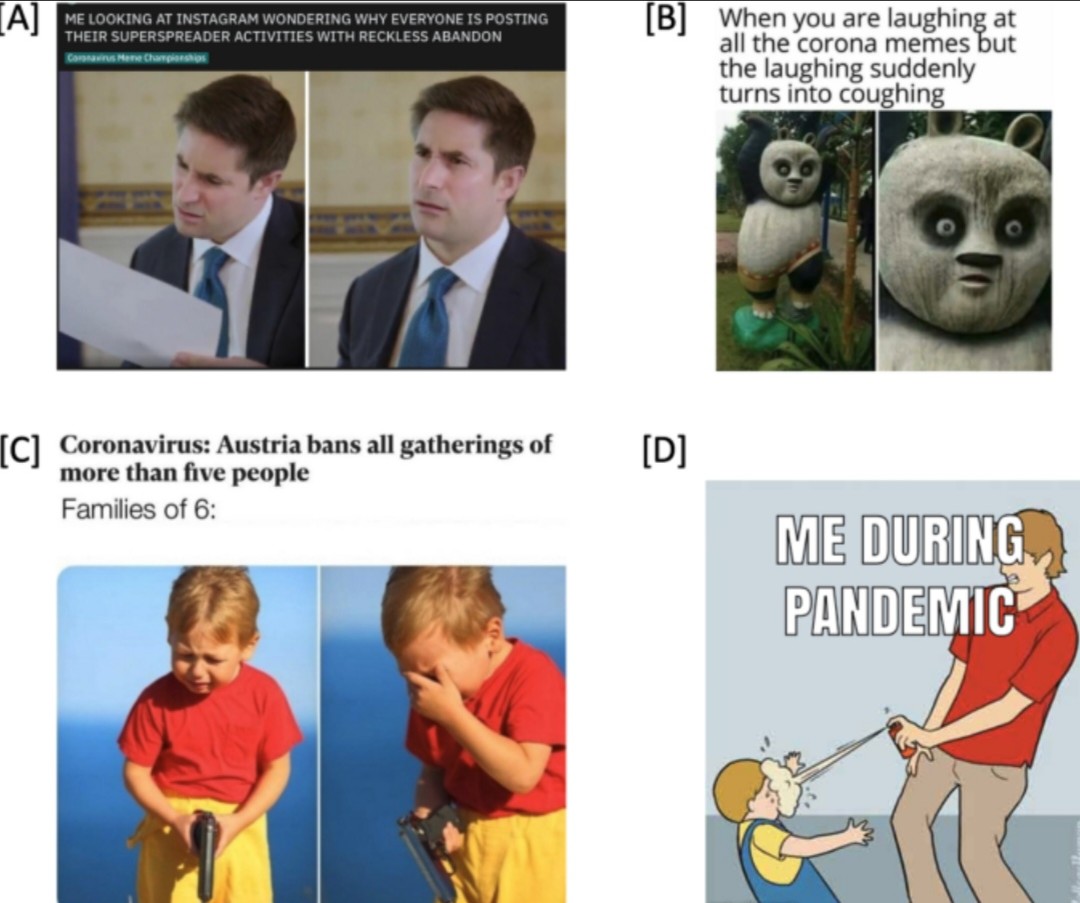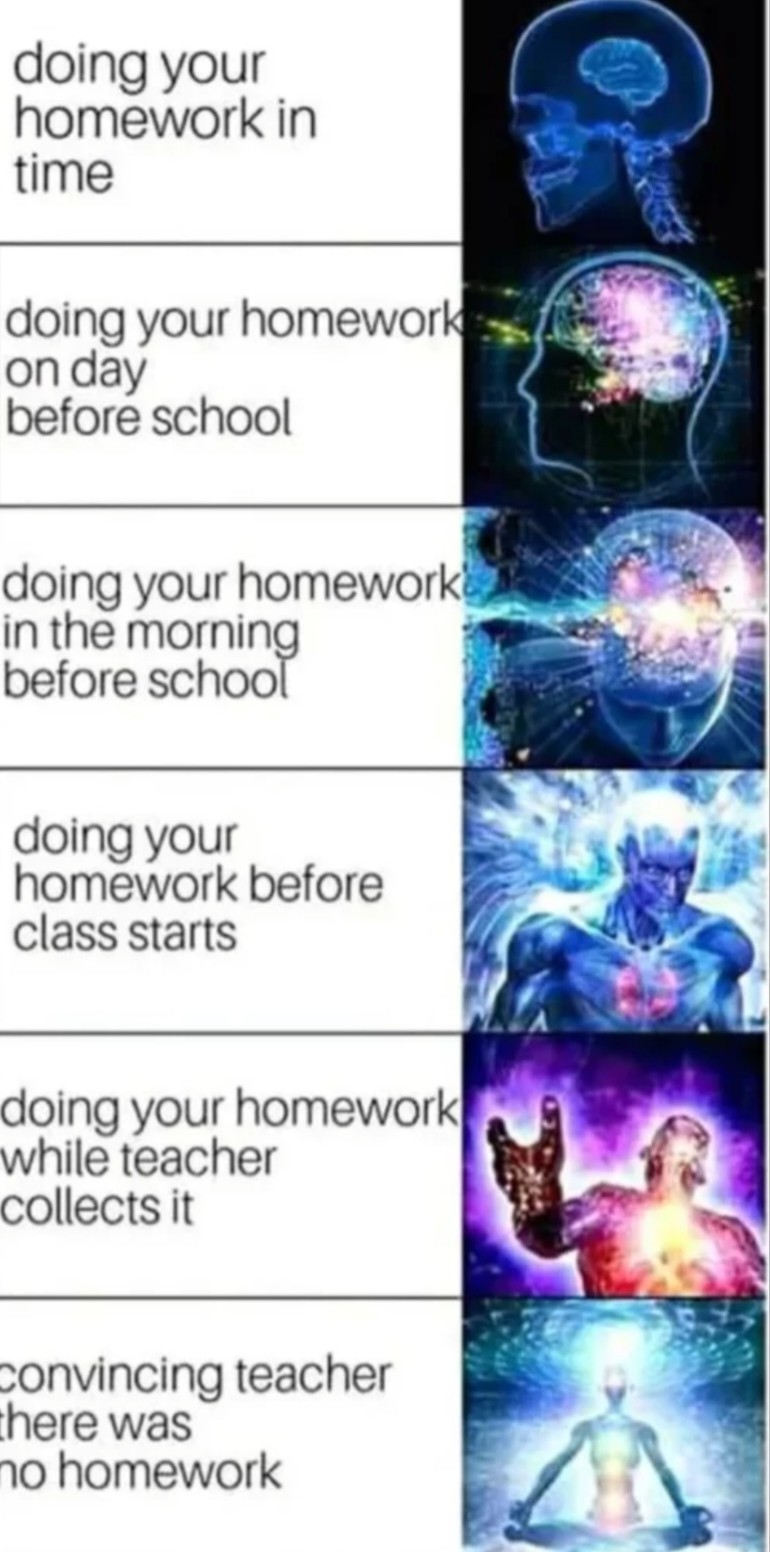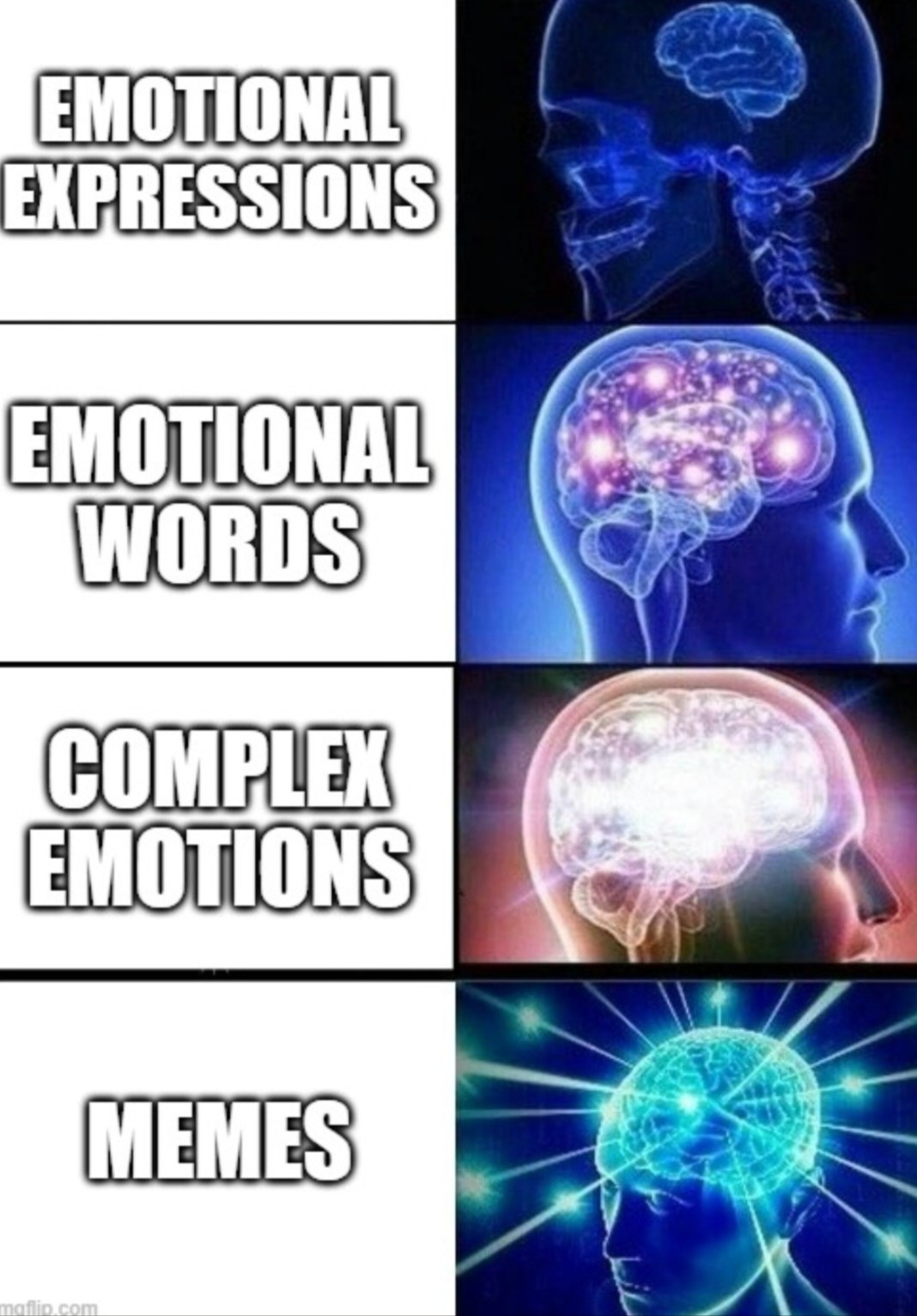Internet memes have become a popular coping mechanism for many individuals experiencing anxiety and stress related to the COVID-19 pandemic. These humorous and relatable images and videos provide a temporary escape from the overwhelming news and uncertainty surrounding the virus.
Memes often touch on common experiences and emotions that people are feeling during this time, such as boredom, loneliness, and fear. By sharing memes with friends and on social media, individuals are able to connect with others and feel a sense of community despite physical distancing measures.
Additionally, memes can help to normalize the range of emotions that people are experiencing, reminding them that it’s okay to feel anxious or overwhelmed during this unprecedented time. In a way, memes act as a form of emotional release, allowing individuals to laugh and find humor in even the most challenging situations. This lighthearted approach to coping with COVID-19 anxiety can provide a much-needed break from the constant stream of negative news and help individuals to feel more relaxed and grounded in the present moment.
Memes for pandemic anxiety relief
In the midst of the ongoing pandemic, many people have found solace in the humor and relatability of memes. These humorous images and videos provide a much-needed distraction from the stress and anxiety that can come with living through a global health crisis. Whether poking fun at the constantly changing guidelines and restrictions, or simply offering a moment of levity in a dark time, memes have become a popular coping mechanism for many.
By sharing and creating memes about the pandemic, individuals are able to connect with others who are experiencing similar emotions and struggles. This sense of community and shared experience can help to alleviate feelings of isolation and fear. Additionally, the creativity and wit displayed in pandemic-related memes can serve as a reminder of the resilience and adaptability of the human spirit.
While memes may not offer a permanent solution to the challenges of the pandemic, they can provide a temporary reprieve and a much-needed laugh in a time of uncertainty. So, next time you’re feeling overwhelmed by the current state of the world, take a moment to scroll through some pandemic memes and remember that we’re all in this together.
Exploring emotion regulation in pandemic memes
The use of memes during the COVID-19 pandemic has been pervasive, providing a means for individuals to express and cope with their emotions in a lighthearted and relatable way. Exploring emotion regulation in pandemic memes can offer valuable insights into how people are managing their feelings during this challenging time. Memes often serve as a form of catharsis, allowing individuals to release pent-up emotions and find humor in difficult situations.
By creating or sharing pandemic memes, people may be engaging in a form of self-soothing or seeking validation from others who can relate to their experiences. Additionally, the act of crafting memes requires a certain level of emotional regulation, as individuals must navigate the fine line between humor and sensitivity when addressing a topic as serious as a global pandemic. Through the analysis of pandemic memes, researchers can gain a better understanding of the coping mechanisms people are using to navigate the uncertainty and stress of the current situation.
Furthermore, studying the emotional responses elicited by pandemic memes can shed light on the ways in which humor and creativity can be powerful tools for managing distress and fostering a sense of connection during times of crisis. In essence, exploring emotion regulation in pandemic memes offers a unique perspective on how individuals are processing and expressing their emotions in the face of adversity, highlighting the resilience and adaptability of the human spirit in the midst of unprecedented challenges.

Online therapy for social anxiety during COVID-19
During the COVID-19 pandemic, many individuals have experienced heightened levels of social anxiety due to isolation and increased stress. Online therapy has emerged as a valuable resource for those seeking support and guidance in managing their social anxiety during these challenging times. Through virtual platforms, individuals can connect with licensed therapists from the comfort of their own homes, eliminating the need for in-person appointments and reducing the risk of exposure to the virus.
Online therapy offers a convenient and accessible alternative to traditional face-to-face therapy, allowing individuals to receive the help they need without having to leave their homes. Additionally, online therapy provides a sense of anonymity and privacy for those who may feel uncomfortable discussing their social anxiety in a public setting. Therapists can utilize a variety of techniques, such as cognitive-behavioral therapy and exposure therapy, to help individuals develop coping strategies and overcome their social anxiety.
By incorporating mindfulness practices and relaxation exercises into their sessions, therapists can help individuals manage their anxiety symptoms and improve their overall well-being. Overall, online therapy has proven to be a valuable resource for individuals struggling with social anxiety during the COVID-19 pandemic, offering a safe and effective way to receive support and guidance in managing their mental health.
Social media’s role in pandemic anxiety
Social media has played a significant role in exacerbating pandemic anxiety. With the constant influx of information and updates about the spread of the virus, it is easy for individuals to become overwhelmed and consumed by fear. The sharing of misinformation and conspiracy theories on social media platforms only adds fuel to the fire, leading to heightened levels of anxiety and uncertainty.
The constant comparison to others and the pressure to appear as though one is coping well during this challenging time can also contribute to feelings of anxiety and inadequacy. Additionally, the fear of missing out on important updates or news can drive individuals to constantly check their social media feeds, further increasing their anxiety levels. The lack of face-to-face interaction and physical touch that social media provides can also contribute to feelings of isolation and loneliness, which can exacerbate existing anxiety.
It is important for individuals to be mindful of their social media consumption and to take breaks when necessary in order to protect their mental health during this challenging time. While social media can be a valuable tool for staying connected and informed, it is essential to be aware of its potential negative impact on mental well-being and to take steps to mitigate these effects.

Conflicts of Interest
Conflicts of interest arise when individuals or organizations face competing interests that could potentially influence their decision-making or actions. These conflicts can create ethical dilemmas and undermine the integrity of decision-making processes. When individuals are faced with conflicts of interest, they may struggle to remain impartial and make decisions that are in the best interest of all parties involved. In some cases, conflicts of interest can lead to biased decision-making, favoritism, or the misuse of power for personal gain.
It is important for individuals and organizations to be aware of potential conflicts of interest and take steps to address them in a transparent and ethical manner. By acknowledging and managing conflicts of interest effectively, individuals and organizations can uphold their credibility and maintain the trust of stakeholders. Transparency, disclosure, and accountability are key principles in managing conflicts of interest and ensuring that decisions are made in a fair and unbiased manner. Ultimately, addressing conflicts of interest requires a commitment to ethical behavior and a willingness to prioritize the interests of others over personal or organizational gain.
Additional Details
Additional details can provide a more comprehensive understanding of a situation, allowing for a more informed decision-making process. By delving deeper into the specifics of a topic, individuals can gain valuable insights that may have otherwise been overlooked. These details can shed light on various aspects of a situation, offering a more nuanced perspective.
Whether it be in business, research, or personal relationships, additional details can help paint a clearer picture and lead to more effective communication. In a world where information is constantly evolving, having access to additional details can be crucial in staying up to date and making well-informed choices. Furthermore, by considering all possible details, individuals can avoid making hasty decisions based on incomplete information.
This can lead to more thoughtful and deliberate actions, ultimately resulting in more successful outcomes. It is important to remember that not all details are created equal, and it is essential to prioritize the most relevant and significant information. By carefully analyzing additional details, individuals can gain a deeper understanding of a situation and make more strategic decisions. In conclusion, paying attention to additional details can be a valuable tool in navigating the complexities of life and achieving success in various endeavors.

Rights & Permissions
Rights and permissions are essential aspects of ensuring that individuals and organizations are able to protect their intellectual property and control how it is used. By establishing rights and permissions, creators are able to dictate who can access and use their work, as well as under what conditions. This allows for greater control over how their work is shared and ensures that they receive proper recognition and compensation for their efforts.
Additionally, permissions play a crucial role in maintaining the integrity and quality of creative works, as creators are able to prevent unauthorized use or modifications that could potentially harm their reputation or the value of their work. In the digital age, where information can be easily shared and disseminated, rights and permissions are more important than ever in safeguarding the rights of creators and ensuring that they are able to benefit from their work.
By respecting the rights and permissions of creators, individuals and organizations can contribute to a more fair and equitable creative ecosystem where innovation and creativity can thrive. Ultimately, rights and permissions serve as a crucial tool in protecting the interests of creators and promoting a culture of respect and collaboration within the creative community.
Professional Growth
Professional growth is an essential aspect of any career trajectory. It involves constantly seeking opportunities to develop and enhance one’s skills, knowledge, and abilities in order to excel in one’s field. This can be achieved through seeking out new challenges, taking on additional responsibilities, pursuing further education or training, and seeking feedback from colleagues and supervisors.
Professional growth is not only important for individual success but also for the overall success of an organization. By continuously striving to improve and grow, professionals can stay competitive in the ever-changing job market and contribute positively to their team and company. Embracing professional growth also allows individuals to stay engaged and motivated in their work, leading to greater job satisfaction and fulfillment. Ultimately, investing in professional growth is an investment in one’s future success and career advancement.
It requires dedication, perseverance, and a willingness to step outside of one’s comfort zone in order to reach new heights and achieve one’s full potential. By prioritizing professional growth, individuals can continue to evolve and adapt to the demands of their industry, ultimately positioning themselves for long-term success and fulfillment in their careers.

Final Thoughts
As we come to the end of our discussion, it is important to reflect on the complexities and nuances of the issues at hand. It is clear that there are many factors to consider when making decisions, and what may seem like a simple choice on the surface can have far-reaching consequences. It is crucial to approach each situation with empathy, understanding, and a willingness to listen to different perspectives. By engaging in thoughtful dialogue and considering a variety of viewpoints, we can work towards finding solutions that are fair and just for all involved.
It is also important to remember that our actions have a ripple effect, impacting not only ourselves but those around us as well. By taking the time to carefully consider our choices and their potential impacts, we can strive to create a more harmonious and equitable society. In the end, it is up to each of us to be mindful of our actions and the ways in which they contribute to the world around us. As we move forward, let us keep these final thoughts in mind and strive to make choices that reflect our values and beliefs.
